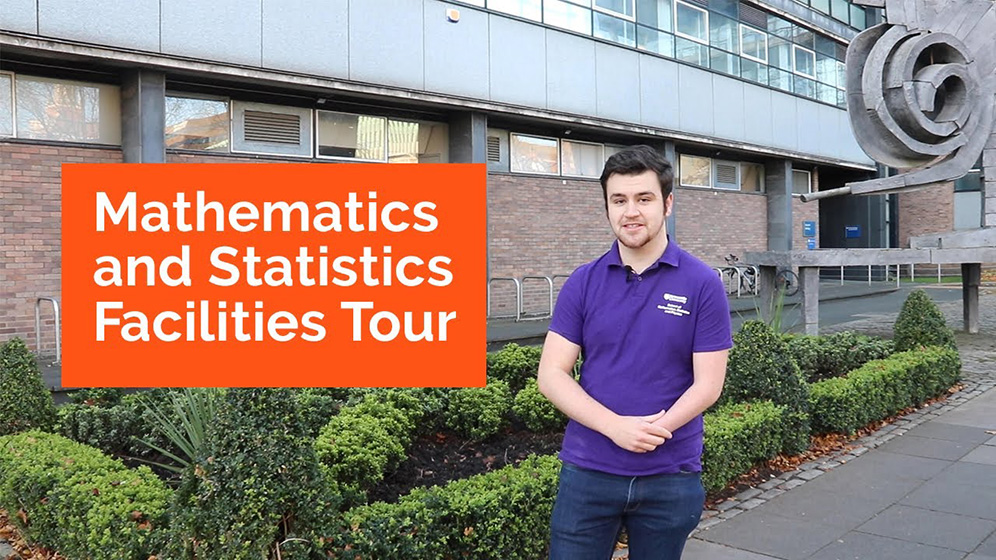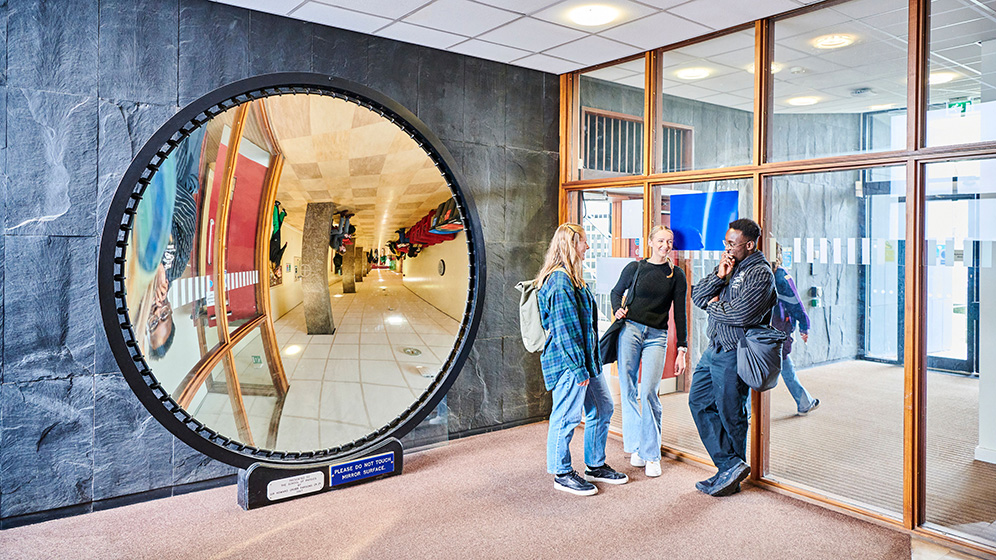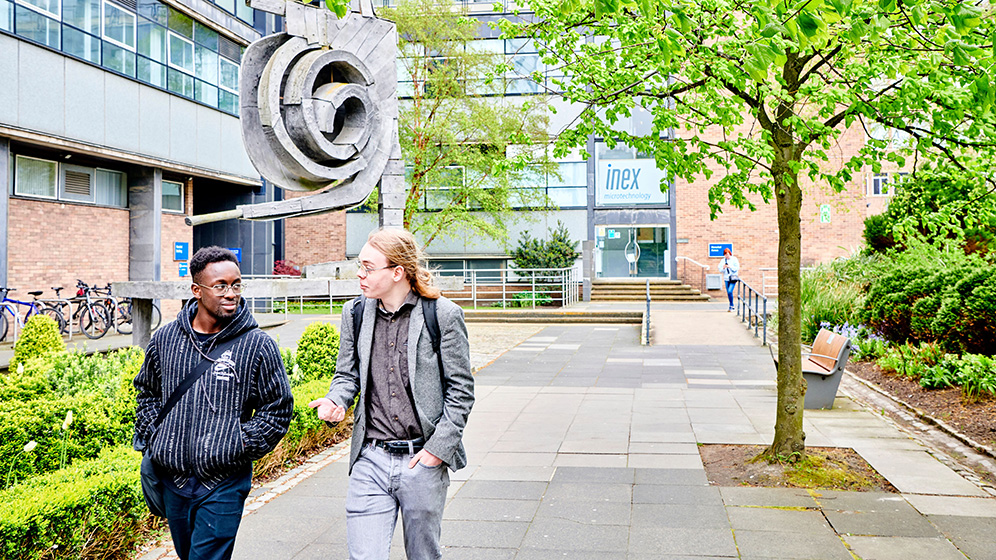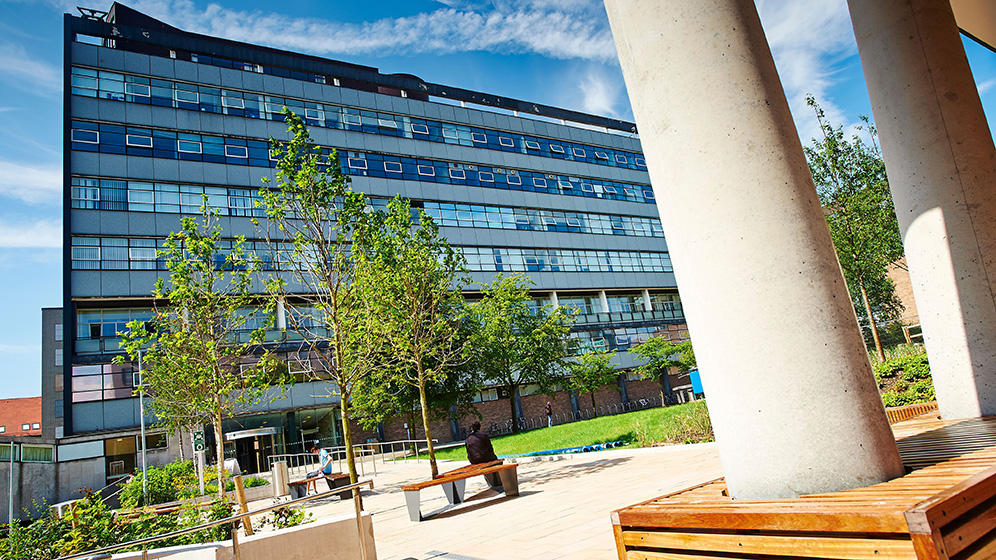Mathematics and Statistics with Foundation Year BSc Honours
- UCAS code: G101
- Full time
- 4 years
Gain the skills you need to pursue a career in an ever-increasing data-driven world. This Mathematics and Statistics Foundation Year degree will prepare you for one of our three-year BSc degrees.
You are currently viewing course information for entry year: 2026
Next start date:
- September 2026
UCAS Institution name and code:
- NEWC / N21
Course overview
This foundation year will give you the knowledge you need to progress to any of our mathematics and statistics BSc degrees.
No mathematics A-Level needed. This foundation year course is for students who don't have an A-Level, or equivalent, in mathematics.
This is a full-time programme. It covers core mathematics and statistics topics, including:
- differential calculus
- complex numbers
- problem-solving skills
You'll gain an understanding of how atomic structures influence mechanical behaviour. You'll explore key scientific principles such as:
- kinematics
- dynamics
- material properties
You'll also develop essential skills in:
- data collection
- statistical analysis
- computer systems
- programming fundamentals
You'll learn about core physics concepts, from forces and energy to atomic structure and radioactivity. This will help prepare you for further study in mathematics and statistics.
Progression
On completing the Foundation Year, you're guaranteed a place in Stage 1 of these degrees:
- Mathematics BSc Honours
- Mathematics and Statistics BSc Honours
- Data Science BSc
- Computing and Mathematics BSc
Sorry, you need JavaScript to view this video
Your course and study experience - disclaimers and terms and conditions
Please rest assured we make all reasonable efforts to provide you with the programmes, services and facilities described. However, it may be necessary to make changes due to significant disruption, for example in response to Covid-19.
View our Academic experience page, which gives information about your Newcastle University study experience for the academic year 2025-26.
See our terms and conditions and student complaints information, which gives details of circumstances that may lead to changes to programmes, modules or University services.
Quality and ranking
Professional accreditation and recognition
All professional accreditations are reviewed regularly by their professional body.
Modules and learning
Modules
The information below is intended to provide an example of what you will study.
Most degrees are divided into stages. Each stage lasts for one academic year, and you'll complete modules totalling 120 credits by the end of each stage.
Our teaching is informed by research. Course content may change periodically to reflect developments in the discipline, the requirements of external bodies and partners, and student feedback.
Optional module availability
Student demand for optional modules may affect availability.
Full details of the modules on offer will be published through the Programme Regulations and Specifications ahead of each academic year. This usually happens in May.
To find out more please see our terms and conditions
You'll cover core mathematics and statistics topics, including:
- differential calculus
- complex numbers
- problem-solving skills
You'll also complete a project during your studies.
Modules
| Compulsory Modules | Credits |
|---|---|
| Statistics | 10 |
| Group Project | 10 |
| Mechanics | 10 |
| Core Mathematics A | 30 |
| Core Mathematics B | 30 |
| Introduction to Computing | 10 |
| Concepts in Thermal and Quantum Physics | 10 |
| The Physics of Oscillations | 10 |
We base these figures and graphs on the most up-to-date information available to us. They are based on the modules chosen by our students in 2024-25.
Teaching time is made up of:
- scheduled learning and teaching activities. These are timetabled activities with a member of staff present.
- structured guided learning. These are activities developed by staff to support engagement with module learning. Students or groups of students undertake these activities without direct staff participation or supervision
Teaching and assessment
Teaching methods
You'll learn through:
- lectures
- problem classes
- tutorials and drop-in sessions
- practical computer classes and computer-based assessments
- data collection and analysis
You'll also engage in independent study. You'll have full support and guidance on selecting and using relevant reading materials.
Assessment methods
You'll be assessed through a combination of:
-
Coursework
-
Examinations – practical or online
-
Group work
-
Projects
Skills and experience
Practical skills
You'll develop the ability to integrate taught theory and analytical methods with problem-solving and practical skills. Through hands-on learning you'll discover how to apply mathematical formalism to some fundamental problems in physics.
You'll also spend time in our computer labs, and will graduate with the knowledge simple algorithms and discuss principles of computer programming.
Business skills
Throughout your degree, you'll develop a range of transferable skills, including:
- analytical writing
- report writing
- project management
- teamwork
Student stories
The versatility of Mathematics is something that appealed to me greatly, it widened my job prospects and will allow me to go down the career I’m interested in.

Facilities and environment
Facilities
You'll join the School of Mathematics, Statistics and Physics based in the Herschel Building.
A state-of-the-art learning environment will support your studies and you'll have access to extensive IT facilities for teaching and self-study, including:
- computer-based exercises with instant review of model solutions
- problem-solving video tutorials
- recording system for video capture of lectures, which you can download and watch again to help with your revision
The Herschel Building also has dedicated study and social spaces, and a computing area.
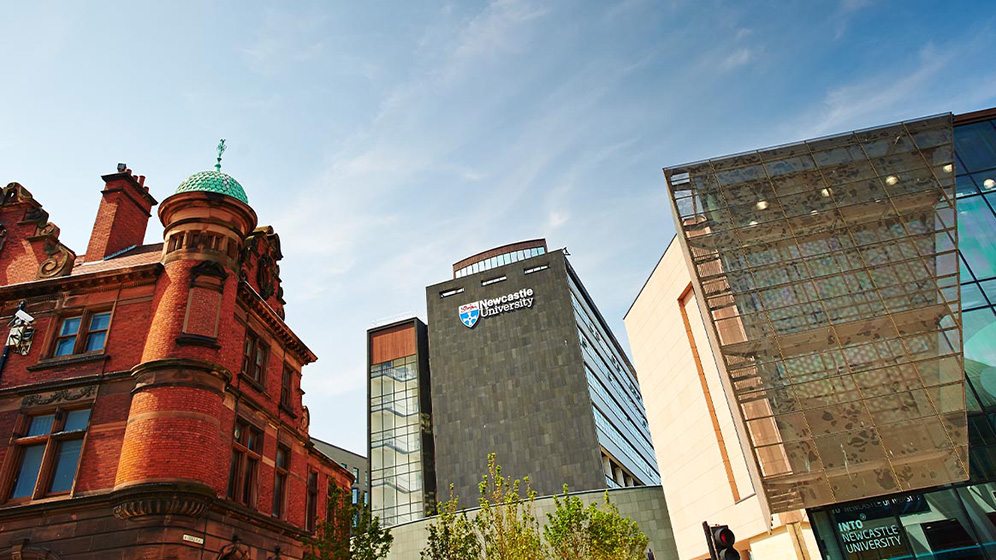
Support
We take your health and wellbeing seriously and are committed to supporting you throughout your studies so you can fulfil your potential at university. This support includes:
- a personal tutor who is an academic member of staff who can help you with academic and personal issues throughout your degree
- a peer mentor scheme which pairs you with a current student from your course to help you navigate your first year at university
- a student-staff committee, to give you an opportunity to have a say in how your degree works
- Student Wellbeing Advisors who can offer comprehensive listening and support and signpost you to other University support services or external support agencies
Transition Officer
A dedicated staff member is here to support you in transitioning from school to university study.
The Transition Officer works with Stage 1 undergraduates to provide:
- Stage 1 pastoral and academic support
- attendance and academic performance monitoring
- Stage 1 induction
- weekly drop-ins
You'll also benefit from our:
- induction programme, including social events, to help you settle in quickly
- activities and events run by our student-run society, MathSoc
- homework classes to help with assignments
Your future
Join a network of successful graduates
This Foundation Year provides a pathway into our Mathematics BSc courses, leading to a range of career opportunities across diverse industries.
Previous graduates from our Mathematics BSc courses have gone into roles within 15 months of graduating, including:
- Data Scientist at Atom Bank
- Software Engineer at Scott Logic
- Performance and Insight Analyst at Lancashire Constabulary
- Data Services Graduate at Dyson
- Data Analyst at Experian
- Senior Information Analyst at NHS
- Mathematics Teacher at Teach First
- Training Actuary at Lloyds Banking Group
- Consultant at Deloitte
- Audit Associate at KPMG
Careers for mathematicians and statisticians
Mathematicians and statisticians have always been highly valued by employers for their analytical and problem-solving skills, and their ability to think logically and quantitatively.
These skills are in increasing demand beyond the traditional sectors of finance, with industries such as technology, healthcare, artificial intelligence, cybersecurity, data science, and engineering actively seeking mathematical expertise to drive innovation and decision-making.
Businesses have ever increasing volumes of data available and this data needs to be analysed and modelled. Our recent graduates are putting their mathematical skills into practice in sectors such as:
- utilities
- defence
- advanced manufacturing
- transportation
- energy
- sports analytics
- health economics
Maths graduates are also highly sought-after for roles in teaching.
You'll also develop key skills which are essential for the employment market such as communication, teamwork, planning, and organisation.
Benefit from strong industry links
You'll also benefit from our well-established links. Our industrial advisory board members and research colleagues influence and inform our curriculum and include representatives from businesses such as:
- Advanced Engineering Solutions
- Atkins Realis
- Azets
- Arup
- Big Spark
- Centre for Process Innovation
- Department for Environment, Food & Rural Affairs (DEFRA)
- Draeger
- National Audit Office
- National Nuclear Laboratory
- Nissan
- North Star Ventures
- Northern Gas Networks
- Northumbria Healthcare
- Roche
- Rosen Group
- Royal Meteorological Society
- Sage plc
- York & North Yorkshire Office for Policing, Fire, Crime and Commissioning
Make a difference
Sorry, you need JavaScript to view this video
Follow in their footsteps

- Name: Emma
- Graduated: 2016
- Now working as: Hiscox Insurance
"It is great to be able to take the skills and knowledge I learnt at university and apply it to real-world applications."
We asked Emma to take a look back at her time at Newcastle and tell us how it has impacted her career as a catastrophe modeller.
Careers support
The School of Mathematics, Statistics and Physics is supported by Careers Service and the Learning Partnerships team to support your career readiness from the moment you arrive.
You'll benefit from:
- guest lectures from alumni and industry built into the modules
- career-planning sessions from award-winning Careers service team employers regularly visiting campus and the School
There is also a Maths, Stats and Physics Employability resource which brings you the latest opportunities, adverts and news.
There is also the popular optional Stage 3 module in Career Development if you wish to further enhance your employability.
Our Careers Service is one of the largest and best in the country, and we have strong links with employers. We provide an extensive range of opportunities to all students through our ncl+ initiative.
Visit our Careers Service website
Recognition of professional qualifications outside of the UK
If you’re studying an accredited degree and thinking about working in Europe after you graduate, the best place to find current information is the UK Government’s guidance on recognition of UK professional qualifications in EU member states. This official resource explains whether your profession is regulated in another country, what steps you need to take, and which organisation you should contact.
Entry requirements
All candidates are considered on an individual basis and we accept a broad range of qualifications.
The entrance requirements and offers below apply to 2026 entry.
| A-Level | |
|---|---|
| International Baccalaureate | |
|---|---|
Other UK and the Republic of Ireland qualifications
Alternative offers at Newcastle
Through one of our contextual or alternative offer routes, you could receive an offer of up to three grades lower than the typical requirements.
Contextual offers
We use certain contextual data from your UCAS form, alongside your application, to consider challenges that you may have faced in your education and the potential effect this may have had on your qualifications. This means you may be eligible to receive a lower contextual offer.
PARTNERS offers
One of the largest and longest support entry routes to university of its kind for students from underrepresented backgrounds. We support applicants from application through to study.
Realising Opportunities offers
A unique programme delivered in collaboration with 10 leading, research-intensive universities in the UK. The programme is open to students in Year 12/first year of college.
Pathways to Newcastle offers
Pathways to Newcastle, our national skills entry route, is available for specific subject areas.
High Performance Athletes
We support promising athletes at the application stage, who compete in regional, national or international levels in their sport.
Qualifications from outside the UK
English Language requirements
Entrance courses (INTO)
International Pathway courses are specialist programmes designed for international students who want to study in the UK. We provide a range of study options for international students in partnership with INTO.
These courses are specifically designed for international students who want to study in the UK and progress onto one of our undergraduate degrees. Our International Study Centre, has a range of study options including:
- International Foundation
- International Year One
- English Language courses
Find out more about International Pathway courses
Admissions policy
This policy applies to all undergraduate and postgraduate admissions at Newcastle University. It is intended to provide information about our admissions policies and procedures to applicants and potential applicants, to their advisors and family members, and to staff of the University.
University Admissions Policy and related policies and procedures
Credit transfer and Recognition of Prior Learning
Recognition of Prior Learning (RPL) can allow you to convert existing relevant university-level knowledge, skills and experience into credits towards a qualification. Find out more about the RPL policy which may apply to this course.
Tuition fees and scholarships
Tuition fees for academic year 2026-2027
The 2026 entry home fees have not yet been confirmed.
| Qualification: BSc Honours | |
|---|---|
|
Home students full time 4 years |
Tuition fees (Year 1)
Not set |
|
International students full time 4 years |
Tuition fees (Year 1)
26,400 |
Year abroad and additional costs
For programmes where you can spend a year on a work placement or studying abroad, you will receive a significant fee reduction for that year.
Some of our degrees involve additional costs which are not covered by your tuition fees.
Scholarships
Find out more about:
Open days and events
You'll have a number of opportunities to meet us throughout the year at our on-campus and virtual open days.
You'll be able to:
- explore our beautiful campus
- find out about our vibrant city
- discover what students think about studying at Newcastle
You'll also have the opportunity to speak to academic staff and find out more about the subjects you're interested in.
Find out about how you can visit Newcastle in person and virtually.
We regularly travel overseas to meet with students interested in studying at Newcastle University. Visit our events calendar to find out when we're visiting your region.
How to apply
Apply through UCAS
To apply for undergraduate study at Newcastle University, you must use the online application system managed by the Universities and Colleges Admissions Service (UCAS). All UK schools and colleges, and a small number of EU and international establishments, are registered with UCAS. You will need:
- the UCAS name and institution codes for Newcastle University (NEWC/N21)
- the UCAS code for the course you want to apply for
- the UCAS 'buzzword' for your school or college
If you are applying independently, or are applying from a school or college which is not registered to manage applications, you will still use the Apply system. You will not need a buzzword.
Apply through UCASApply through an agent
International students often apply to us through an agent. Have a look at our recommended agents and get in touch with them.
Get in touch
By phone
Call us on +44 (0) 191 208 3333 and press option 1. Our opening hours are Monday to Friday 10am until 4pm.
Live chat
Our NCL chatbot might be able to give you an answer straight away. If not, it’ll direct you to someone who can help.
You'll find our NCL chatbot in the bottom right of this page.
Online
Chat to our students
Choosing a university is a big decision. If you've got questions about a particular course, student life or the city of Newcastle, why not chat to our friendly students or graduates!
Keep updated
We regularly send email updates and extra information about the University.
Receive regular updates by email



